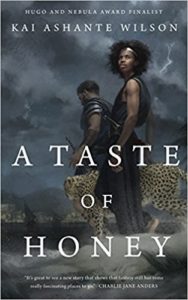In A Taste of Honey Kai Ashante Wilson tells a love story spanning decades in a fantastic world that looks much like the ancient Mediterranean. One of the lovers is a soldier from an empire that resembles Rome, the other is a young member of a noble house in a North African polity. (I don’t know Maghrebi history well enough to say if Wilson is using a particular model.) The African society is rich and cultured; the imperial visitors from across the sea represent a rough, almost barbaric society, but one that is pragmatic above all. Both are men.
In Daluz (the not-Rome) such a relationship is not unusual. In Olorum, it is distinctly frowned on, to the extent of endangering the protagonists’ lives. A Taste of Honey is thus also a story of star-crossed lovers, constrained by the people around them and forced to show their love in secret. Aqib’s high position in Olorumi society and Lucrio’s as a soldier in an embassy mean that exposure would have diplomatic consequences as well.
It’s a lovely tale, briskly told. The contrasting societies are only sketched, but it is clear that there are layers supporting this and other stories in the same world. There are various kinds of magic that are neither extravagant nor uncommon, but simply shaping the way the world works. It’s a setting that feels fully lived in, one that shapes the protagonists rather than being bent to their story’s needs. Aqib and Lucrio start as an unlikely pair, as is to be expected when the relationship starts with a soldier calling out to someone he thinks is pretty, but there is quickly more than just physical attraction at work.
The magic of this world also plays an important part in the novella’s ending. I did not expect A Taste of Honey to end the way it did, yet it makes logical sense is emotionally satisfying, causing me to reflect on all of what had gone before and see it in a different light. I liked A Taste of Honey enough that I immediately bought Wilson’s other novella set in this world, The Sorcerer of the Wildeeps.
A Taste of Honey was the twelfth bit of Hugo reading that I completed this year, and the eleventh I have written about.

